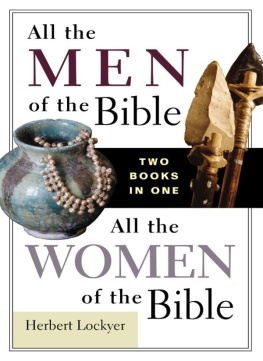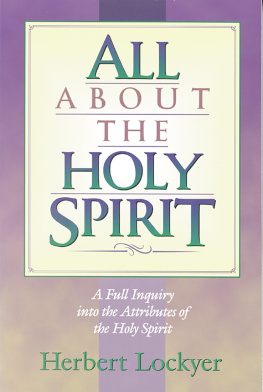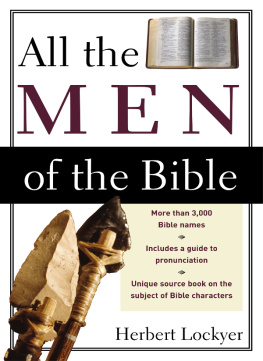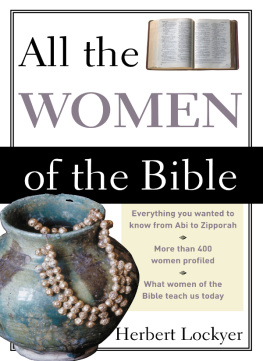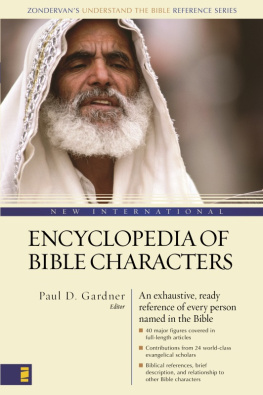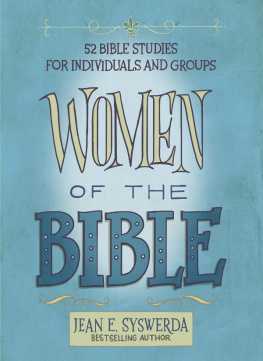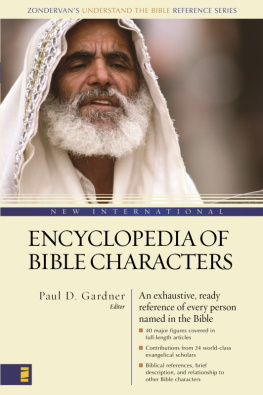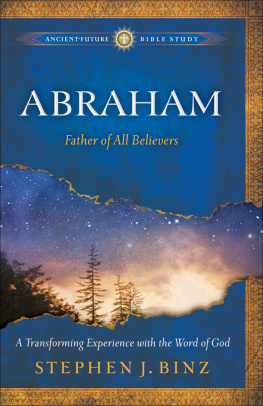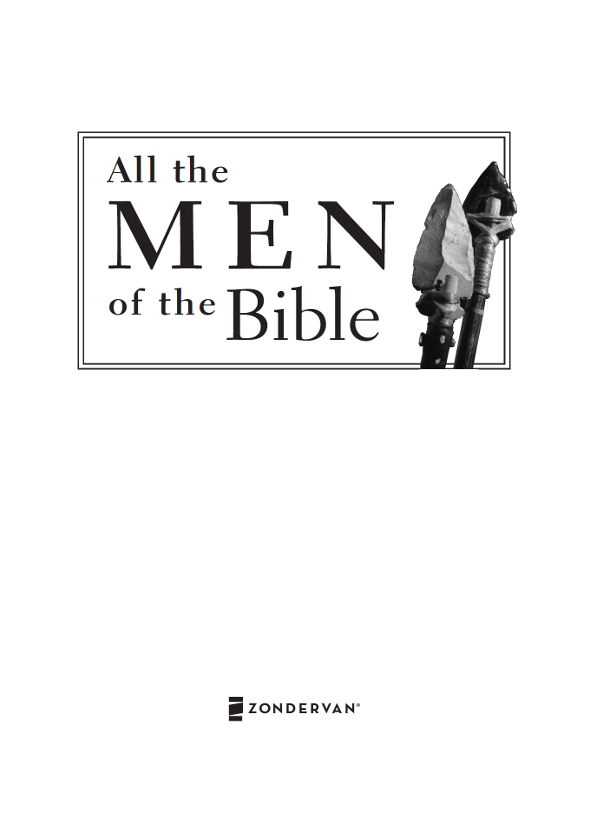Copyright 1967 by The Zondervan Corporation.
All rights reserved. No part of this publication may be reproduced, stored in a retrieval system, or transmitted in any form or by any means electronic, mechanical, photocopy, recording, or any other except for brief quotations in printed reviews, without the prior permission of the publisher.
All Scripture quotations, unless otherwise indicated, are taken from The Holy Bible, New International Version, NIV. Copyright 1973, 1978, 1984 by Biblica, Inc. Used by permission of Zondervan. All rights reserved worldwide.www.Zondervan.com. The NIV and New International Version are trademarks registered in the United States Patent and Trademark Office by Biblica, Inc.
Books in This Series
All the Apostles of the Bible
All the Divine Names and Titles in the Bible
All the Doctrines of the Bible
All the Men of the Bible
All the Messianic Prophecies of the Bible
All the Miracles of the Bible
All the Parables of the Bible
All the Prayers of the Bible
All the Promises of the Bible
All the Women of the Bible
D EDICATED TO
BERT AND JEFF DUVALL, OF TEXAS, WHOSE GENEROSITY KNOWS NO BOUNDS
Dr. Herbert Lockyer was born in London in 1886 and held pastorates in Scotland and England for twenty-five years before coming to the United States in 1935.
In 1937 he received the honorary Doctor of Divinity degree from Northwestern Evangelical Seminary.
In 1955 he returned to England where he lived for many years. He then returned to the United States where he continued to devote time to the writing ministry until his death in November of 1984.
All poetry is but a giving of names.
Biography is the only true history:
History is the garb of biography.
Thomas Carlyle
The beginning of all instruction is the study of names
Antisthenes, c. 400 B.C.
Contents
Below is a partial list of the major and familiar male characters of the Bible covered in this book, alphabetically arranged for easy reference:
A ARON ,
A BEL ,
A BRAHAM ,
A BSALOM ,
A CHAN ,
A DAM ,
A GRIPPA ,
A MOS ,
A NANIAS ,
A NDREW ,
B ARNABAS ,
B ENJAMIN ,
C AIN ,
D ANIEL ,
D AVID ,
E LI ,
E LIJAH ,
E LISHA ,
E NOCH ,
E SAU ,
E ZEKIEL ,
E ZRA ,
F ELIX ,
G IDEON ,
G OLIATH ,
H AM ,
H EROD ,
H EZEKIAH ,
I SAAC ,
I SAIAH ,
J ACOB ,
J AMES ,
J EPHTHAH ,
J EREMIAH ,
J EROBOAM ,
J OAB ,
J OB ,
J OHN
the Baptist,
J OHN
the Beloved Disciple,
J ONAH ,
J ONATHAN ,
J OSEPH (O.T.),
J OSEPH (N.T.),
J OSEPH O F A RIMATHAEA ,
J OSHUA ,
J UDAS ,
L AZARUS ,
L OT ,
L UKE ,
M ARK ,
M ATTHEW ,
M ELCHIZEDEK ,
M ETHUSELAH ,
M OSES ,
N AAMAN ,
N EHEMIAH ,
N ICODEMUS ,
N IMROD ,
N OAH ,
O NESIPHORUS ,
P AUL ,
P ETER ,
P HARAOH ,
P HILIP ,
P ONTIUS P ILATE ,
S AMSON ,
S AMUEL ,
S IMEON ,
S OLOMON ,
S TEPHEN ,
T HOMAS ,
T IMOTHY ,
Z ACCHAEUS ,
The Romantic History of Bible Names
I
The Romantic History of Bible Names
Many readers of the Bible treat its genealogical lists as despised regions, and wonder why they form part of a divine revelation such as the Bible is. At first glance, there seems to be no point or profit in the bare enumeration of the names of men who died thousands of years ago.
Yet because the Bible is the inspired Word of God, even these uninteresting lists of names were written for our learning, and if properly studied they yield remarkable results. Many of these names describe nations, as well as men, and have therefore a priceless historical value. Consulting them, we find they often show the course taken by men in their settlement over the earth. Ancient Hebrew names, which at first sight might appear unattractive, and are passed over as unworthy of serious thought, have something about them which compels our prayerful consideration. In many cases Bible names are fragments of ancient history, revelations of divine purposes, expressions of hopes and prophecies of the future.
Every Jew kept a record of his lineage and was proud if he could claim royal or priestly descent. Joseph, for example, could boast of himself as a son of David. The genealogical lists of Chronicles, Ezra, Nehemiah, Matthew and Luke, containing the majority of named men, prove how meticulous the Jews were in the preservation of their pedigree. It was common in almost every Jewish family to transcribe a family tree.
Josephus, the Jewish historian who lived in the time of our Lord, tells us that he could trace his ancestry back to the Maccabeans, or priest-rulers, from public registers. He also states that wherever Jews settled such registers were kept of births and marriages of the priesthood, and that registers went back some two thousand years. That the Israelites were most interested in the preservation of their pedigree can be proven by I Chronicles 9:1. The forfeit of those tribes who had lost their pedigree is seen in Ezra 2:59 and Nehemiah 7:63.
Truth taught by names is another important aspect to observe. The significance of names opens up a field of pleasant and profitable investigation to all true lovers of Scripture. While many of the names may not have been designed to be typical, they are certainly suggestive of spiritual truth, as can be seen in the names Jacob gave his sons. In ancient Israel the name of a person was supposed to indicate some characteristic of that person, or be linked to circumstances, however trivial or monotonous, connected with his birth. Names and nature, as well as names and facts, were made to correspond, as can be found in the name Moses gave his son (Ex. 2:22), and the naming of Ichabod (I Sam. 4:21). As we review the suggested meanings given to the names alphabetically set forth in the following chapter, we will find that they cover many associations.
Names denote natural or personal qualities. A classic illustration of this is Abigails plea to David for her worthless husband:... as his name is, so is he: Nabal is his name and folly is with him (I Sam. 25:25). Nabal means fool. In effect then, Abigail said, Pay no attention to my husband. Hes a fool by name, and a fool by nature.
Names point to an occupation. There are many instances of these occupational names: Archippus, governor of horses; Asa, physician; Carmi, vine-dresser.

